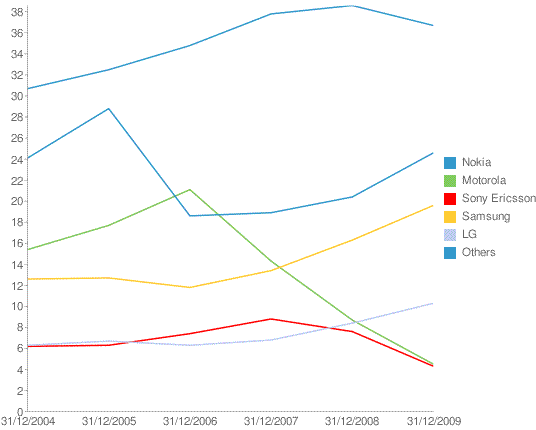Interestingly, before Motorola became the champion of all things Android in the past 18 months or so, I would have said the MSI piece looked a whole lot better. Motorola's cell phone business was absolutely hemorrhaging market share to its various rivals to the point it was scraping along at about 5% as of the end of 2009 in the conventional cell phone business:
 |
| Credit goes to MobileMentalism.com |
Clearly, Android has good prospects going forward and Motorola's offerings in particular have a great deal to offer. I happen to have the original Droid myself so I am a little biased, but I'm a fairly big fan. Of course, Motorola's fortune's are not tied entirely to Android since other manufacturers, including HTC, can just take market share from Motorola and the others in the context of a growing Android pie. There's a good article in the Economist that expresses some skepticism on this point.
However, the profitability of the enterprise segment, which is now MSI, is on more solid footing at this point. The mobile division has been bleeding money, though at a slowing rate, for some time. With improved sales, that should reverse, but the current state of things is that the MSI segment is the more profitable one at the moment.
As a shareholder in Motorola, I now hold annoying amounts of both and have to decide what to do with the respective positions. When I originally bought Motorola, it was based on the idea that Android would help revive the fortunes of their cell phone division. This ended up not paying off as soon as I had hoped, but the indications are that they are really starting to hit their stride now. On this basis, I'll place the majority of my bets with MMI, though I have to round out the MSI position because it is a very irritating 12 shares right now. I like what I see in both segments, but I'll continue to bet on the Motorola mobile turnaround. In some ways, though, each is better than the other. In case you are wondering where I got that from, watch this trailer for a Fist Full of Dollars and For a Few Dollars More double feature:
